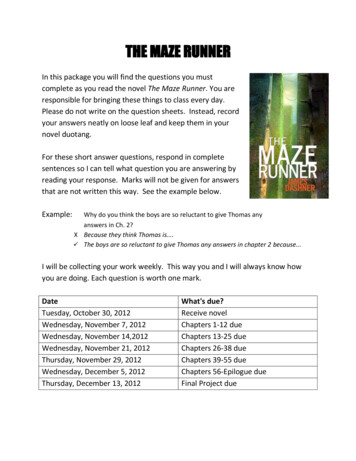
Transcription
Why Read and Study Genesis?In Genesis, its first book, the Bible hits the ground running and showsus the kind of people we could see today on the news, or meet on the street,wrestling with God to find happiness, success, and love in a world gonewrong. They struggle. They suffer. They do right, and they do wrong. WithGod’s help, sometimes they fight their way through to a happy ending. AndGod builds on the struggles, the suffering, and the good and bad choices tostart making a way for anyone in the world to find their way back to him.Maybe you’ve never read the book of Genesis. Or maybe you’ve tried butnever got past the opening because of arguments you’ve heard about Adamand Eve and evolution. You owe it to yourself to take another look. Froma perspective deeply immersed in real human life, Genesis gives us the bigpicture of what kind of world God wants this to be, how it became somethingelse instead, and what God has been doing ever since, by meeting people justwhere they are, to make things right again.The main purpose of Genesis is to explain how one family and its descendants came to have a special role in God’s plans for all of humanity. Thebook first shows God creating a world of order and harmony. This orderand harmony is shattered when people turn away from God. The world isfilled with violence and injustice that God has to take extreme measures torestrain. But then God begins to restore the beautiful world he’d designed byentering into a relationship with one person who trusts and believes in himin a special way: Abraham. God extends this relationship down through thegenerations of Abraham’s descendants. Eventually they grow into a tribe thatcould become the beginning of a restored human community—if they couldjust live up to God’s friendship and favor.
This study guide will take you through Genesis story by story and character by character. You won’t see Noah in a bathrobe collecting cuddly animalsfor the ark. You won’t be asked to debate the age of the earth. But you willmeet people just like you being disappointed and betrayed and rescued andblessed as the world God sets in motion goes careening off into the futurewithout any brakes. Fasten your seat belt.Understanding theBooks of the BibleGENESIS
Also available in theUnderstanding the Books of the Bible series:JohnWisdom: Proverbs/Ecclesiastes/James—October 2010Biblical Apocalypses: Daniel/Revelation—October 2010Future releases:Exodus/Leviticus/NumbersNew Covenants: /MalachiPsalms/Song of ippians/Timothy/TitusPeter/Jude/JohnUnderstanding the Books of the BibleGENESISChristopher R. Smith
ContentsWhy Read and Study Genesis?iFor LeadersHow These Study Guides Are Different1Session 1Experiencing the Book of Genesis As a WholeBiblica PublishingWe welcome your questions and comments.USAIndia1820 Jet Stream Drive, Colorado Springs, CO 80921Logos Bhavan, Medchal Road, Jeedimetla Village, Secunderabad 500 055, A.P.Session 29UNIT I: In the BeginningThe Seven Days of Creation15Session 3The Creation and Fall of Humanity19Session 4Wickedness Spreads Throughout the WorldUnderstanding the Books of the Bible: GenesisISBN-13: 978-1-60657-055-5Copyright 2010 by Christopher R. Smith12 11 10 / 6 5 4 3 2 1Published in 2010 by BiblicaAll rights reserved. No part of this book may be reproduced in any form without permission in writingfrom the publisher, except in the case of brief quotations embodied in critical articles or reviews.Scripture quotations are taken from the Holy Bible, TODAY’S New InternationalVersion TNIV . Copyright 2001, 2005 by Biblica, Inc. . Used by permission of Zondervan. Allrights reserved worldwide.23Session 5The Flood27Session 6God’s Covenant with Noah31Session 7Humanity is Divided into NationsSession 834UNIT II: AbrahamAbram Answers God’s Call and Travels to the Land of Canaan41Session 9God Gives Abram Victory in Battle and Promises Him a Son47Session 10A catalog record for this book is available through the Library of Congress.Ishmael is Born; God Gives a Covenant Sign and New Names52Session 11Printed in the United States of AmericaAbraham’s Three Visitors56Session 12Sodom and Gomorrah59Session 13Abraham Moves Into the Negev Region; Isaac is Born63Session 14God Tells Abraham to Sacrifice Isaac; the Death and Burial of Sarah66Session 15Abraham’s Servant Finds Rebekah as a Wife for Isaac;The Death of Abraham69
For LeadersUNIT III: Isaac and JacobSession 16The Descendants of Ishmael; Isaac Gets Established75Session 17Jacob Steals the Firstborn’s Blessing from Esau79Session 18Jacob Flees to Harran83Session 19Jacob Flees Back Towards Canaan87Session 20Jacob Returns to the Land of CanaanHow These Study Guides Are Different91Session 21Jacob’s Family Back in CanaanSession 2296UNIT IV: Joseph and His BrothersInto the Next Generation: The Legacies of Esau and Jacob103Session 23Judah and Tamar106Session 24Joseph as a Slave and a Prisoner110Session 25Joseph Interprets Pharaoh’s Dream and Becomes a Ruler of Egypt113Session 26Joseph’s Brothers Come to Buy Grain116Session 27Joseph’s Brothers Return with Benjamin119Session 28Jacob’s Family Moves to Egypt123Session 29Jacob’s Deathbed Blessings127Session 30The Deaths of Jacob and Joseph131Did you know you could read and study the Bible without using anychapters or verses? The books of the Bible are real “books,” and they’re meantto be experienced the same way other books are: as exciting, interesting worksthat keep you turning pages right to the end and then make you want to goback and savor each part. The Understanding the Books of the Bibleseries of study guides will help you do that with the Bible.While you can use these study guides with any version or translation,they’re especially designed to be used with The Books of The Bible, an editionof the Scriptures from Biblica that takes out the chapter and verse numbersand presents the biblical books in their natural form. Here’s what people aresaying about reading the Bible this way:I love it. I find myself understanding Scripture in a new way, witha fresh lens, and I feel spiritually refreshed as a result. I learn muchmore through stories being told, and with this new format, I feel thetruth of the story come alive for me.Reading Scripture this way flows beautifully. I don’t miss the chapterand verse numbers. I like them gone. They got in the way.I’ve been a reader of the Bible all of my life. But after reading just a fewpages without chapters and verses, I was amazed at what I’d been missingall these years.1
For more information about The Books of The Bible or to obtain a lowcost copy, visit http://www.thebooksofthebible.info. Premium editions ofthis Bible will be available in Spring 2011 from Zondervan at your favoriteChristian retailer.For people who are used to chapters and verses, reading and studying theBible without them may take a little getting used to. It’s like when you get anew cell phone or upgrade the operating system on your computer. You haveto unlearn some old ways of doing things and learn some new ones. But it’snot too long until you catch on to how the new system works and you findyou can do a lot of things you couldn’t do before.Here are some of the ways you and your group will have a better experience of the Scriptures by using these study guides.You’ll Follow the Natural Flowof Biblical BooksThis guide will take you through the book of Genesis following its natural flow. (The way the book unfolds is illustrated on page 11.) You won’t gochapter-by-chapter through Genesis, because chapter divisions often comeat the wrong places and break up the flow. Did you know that the chapterdivisions used in most modern Bibles were added more than a thousandyears after the biblical books were written? And that the verse numbers wereadded more than three centuries after that? If you grew up with the chapterand-verse system, it may feel like part of the inspired Word of God. But it’snot. Those little numbers aren’t holy, and when you read and study Genesiswithout them, you’ll hear the story emerge as never before.To help you get a feel for where you are in the book’s natural flow, eachstudy session will be headed by a visual cue, like this:Genesis Account of Terah Abraham Story, Episodes1 and 22You’ll Understand Whole BooksImagine going to a friend’s house to watch a movie you’ve never seenbefore. After only a couple of scenes, your friend stops the film and says, “So,tell me what you think of it so far.” When you give your best shot at a reply,based on the little you’ve seen, your friend says, “You know, there’s a scenein another movie that always makes me think of this one.” He switches toa different movie and before you know it, you’re watching a scene from themiddle of another film.Who would ever try to watch a movie this way? Yet many Bible studies take this approach to the Bible. They have you read a few paragraphsfrom one book of the Bible, then jump to a passage in another book. TheUnderstanding the Books of the Bible series doesn’t do that. Instead,these study guides focus on understanding the message and meaning of onebook.Your group will read through the entire book of Genesis, not just selectedchapters or verses. The thirty studies in this guide are organized into fourunits of six to nine studies each, so that groups that meet weekly can workthrough each unit in a couple of months and take a break in between if theywish.You’ll Decide For Yourselves What to DiscussIn each session of this study guide there are many options for discussion.While each session could be completed by a group in about an hour and ahalf, any one of the questions could lead to an involved conversation. There’sno need to cut the conversation short to try to “get through it all.” As a groupleader, you can read through all the questions ahead of time and decide whichone(s) to begin with, and what order to take them up in. If you do get intoan involved discussion of one question, you can leave out some of the others,or you can extend the study over more than one meeting if you do want tocover all of them.3
Together, You’ll Tell the StoryEach session gives creative suggestions for reading the passage you’ll bediscussing. The guide will often invite the group to dramatize the Scripturesby reading them out loud like a play. The discussion options may also invitegroup members to retell the biblical story from a fresh perspective. This kindof telling and retelling is a spiritual discipline, similar to Bible memorization,that allows people to personalize the Scriptures and take them to heart. Ourculture increasingly appreciates the value and authority of story, so this isa great discipline for us to cultivate. (If you’re using The Books of The Bible,you’ll find that the natural sections it marks off by white space correspondwith the sections of the reading. If you’re using another edition, you’ll be ableto identify these sections easily because they’re identified in this guide by theiropening lines.)To create a climate of trust where this kind of deep sharing is encouraged,here are a couple of ground rules that your group should agree to at its firstmeeting: Confidentiality. Group members agree to keep what is shared inthe group strictly confidential. “What’s said in the group staysin the group.”Respect. Group members will treat other members with respectat all times, even when disagreeing over ideas.How to Lead Group Studies Using This GuideEach session has three basic parts:Introduction to the StudyEverybody Will ParticipateThere’s plenty of opportunity for everyone in the group to participate.Because Genesis is a story with characters, as you read from it in each sessionyou’ll often have different group members taking the parts of different characters. Group members can also read the session introduction aloud or thediscussion questions. As a leader, you can easily involve quiet people by givingthem these opportunities. And everyone will feel that they can speak up andanswer the questions, because the questions aren’t looking for “right answers.”Instead, they invite the group to work together to understand the Bible.Have a member of your group read the introduction to the session outloud to everyone. Then give group members the chance to ask questionsabout the introduction and offer their own thoughts and examples.Reading from GenesisRead the selection out loud together. (The study guide will offer suggestions for various ways you can do this for each session. For example, sometimes you will assign different characters in the story to different readers, andsometimes different people will read different sections of the passage.)Discussion QuestionsYou’ll All Share DeeplyThe discussion questions will invite you to share deeply about your ideasand experiences. The answers to these questions can’t be found just by “looking them up.” They require reflection on the meaning of the whole passage,in the wider context of Genesis, in light of your personal experience. Thesearen’t the kinds of abstract, academic questions that make the discussion feellike a test. Instead, they’ll connect the Bible passage to your life in practical,personal, relational ways.4Most questions are introduced with some observations. These may givesome background to Jewish culture, or explain where you are in the flowof the story. After the observations there are suggested discussion questions.Many of them have multiple parts that are really just different ways of gettingat an issue.You don’t have to discuss the questions in the order they appear in thestudy guide. You can choose to spend your time exploring just two or threequestions and not do the others. Or you can have a shorter discussion of each5
question so that you do cover all of them. As the group leader, before themeeting you should read the questions and the observations that introducethem, and decide which ones you want to emphasize.When you get to a given question, have someone read aloud the observations and the question. As you answer the question, interact with theobservations (you can agree or disagree with them) and with the reading fromGenesis. Use only part of the question to get at the issue from one angle, oruse all of the parts, as you choose.Sometimes there will be things to do or think about in preparation foryour next session. But there’s never any “homework” in the traditional sense.This guide can also be used for individual study. You can write out yourresponses to the questions in a notebook or journal. (However, we reallyencourage reading and studying the Bible in community!)Tips for Home Groups, Sunday SchoolClasses, Community Bible Experiences,and Individual UseIf you’re using this guide in a home group, you may want to begin eachmeeting (or at least some meetings) by having dinner together. You may alsowant to have a time of singing and prayer before or after the study.If you’re using this guide in a Sunday school class, you may want to have atime of singing and prayer before or after the study.This study guide can also be used in connection with a community Bibleexperience of Genesis. If you’re using it in this way: 6Encourage people to read each session’s Scripture passage bythemselves early in the week.Do each session in midweek small groups.Invite people to write/create some response to each small-groupsession that could be shared in worship that weekend. Thesemight involve poetry, journal or blog entries, artwork, dramas,videos, and so on.During the weekend worship services, let people share theseresponses, and have preaching on the Scripture passage that wasstudied that week. Preachers can gather up comments they’veheard from people and draw on their own reflections to sum upthe church’s experience of that passage.7
Session 1Experiencing the Book of GenesisAs a WholeBefore considering the individual parts of any creative work, it’s importantto experience it as a whole. This gives you the “big picture,” the overall message, and allows you to understand each part in its proper context. Everyonein your group should read or listen to the entire book of Genesis, all at onceor in just a few installments, before you do the other studies in this guidetogether.If you have a copy of The Books of The Bible, begin by reading the introduction to Genesis in that volume. If you don’t, the material on “Why Readand Study Genesis?” at the beginning of this study guide will give you a basicsense of what the book’s major themes are. The outline on page 11 and theintroductions to sessions 2 and 3 will show you how it’s put together.There are a number of enjoyable and meaningful ways you can read orlisten to the book of Genesis:Hold a Longer Meeting to Read Aloud. You can gather your wholegroup for a special longer meeting where you’ll read the book of Genesis outloud. If you’re doing a church-wide experience of Genesis, the entire churchcan gather for this activity.The book of Genesis takes about four hours to read. You may want tobegin in the early afternoon with the stories of the early history of the humanrace, which are covered by Unit I in this guide. Take a break for a physicalactivity and some informal discussion of what you’ve heard. Then read thestories of Abraham, Isaac and Jacob (covered in Units II and III). Take another9
Outline of the book of genesisListen to an Audiobook of Genesis. Alternatively, you can listen to aprofessional recording. You may prefer to listen to Genesis in Today’s NewInternational Version (TNIV), since that’s the translation used in The Booksof The Bible and in these studies. The TNIV Audio Bible by Zondervan (ISBN:9780310922858) is available through Christian bookstores and many onlineoutlets. The book of Genesis in the TNIV is available for free download inaudio format at www.biblica.com/bible/audio/tniv/index.php.Combine Reading and Service. Group members can also experiencethe whole book of Genesis together in smaller gatherings centered aroundfellowship, learning, and service. A few people could get together to bakehomemade bread, for themselves or for a local soup kitchen. One personcould teach breadmaking to the others, and everyone could read Genesisaloud while the bread is rising and baking. Another group might gather torepair small appliances for people in need and listen to a recording of thebook while they work together. You can take many similar approaches, basedon the interests and abilities of the people in your group, to make your experience of the whole book an occasion for community-building and service.Reading Alone and Interacting in Social Media. People could readGenesis individually, over a defined period of time, and commit to postingonline about what they’re reading and to interacting with what others aresaying.Take whatever creative approach will allow you to experience the wholebook in a fresh, enjoyable and meaningful way before you do the other sessions in this guide.In whatever way you hear Genesis read out loud, as you listen to thebook, the following outline can help you see how the story is unfolding.10The book of Genesis tells the story of humanity’s earliest relationship with God. It traces thedescendants of key figures to show how that relationship developed. The book alternates itsfocus between the community that God entered into a covenant relationship with and humanity outside that community. (“Account” means the story of a figure’s descendants.)ALL NATIONSAdam and EveThe FallCain and AbelCain’s descendantsPrologueThe 7 Days of CreationThe Account of theHeavens & the EarthThe Account ofAdamThe Account ofNoahHumanity divides upinto nationsThe descendantsof Ishmael(Abraham’s son)The descendants ofEsau (Isaac’s son)1. as a family2. as the nation ofEdomCOVENANTCOMMUNITYThe Account of Shem,Ham & JaphethAdam’s descendantsdown to NoahThe FloodGod’s Covenant withNoahThe Account ofShemShem’s descendentsdown to AbrahamThe Accountof TerahThe life of AbrahamThe Account of IsaacThe lives of Isaac,Jacob, and EsauExperiencing the Book of Genesis as a WholeExperiencing the Book of Genesis as a Wholebreak and have dinner together. Then finish the book in the early evening byreading the story of Joseph and his brothers (Unit IV).For the reading itself, volunteers can take turns reading aloud fromGenesis. Change readers every time you come to what seems like the end ofa scene.The Account of IshmaelThe Account of Esau (1)The Account of Esau (2)The Account ofJacobThe lives of Jacob’ssons, especially Joseph11
UNIT IIn the Beginning
Session 2The Seven Days of CreationBook of Genesis PrologueIntroductionA magnificent lyrical prologue sets the stage for the events in the book ofGenesis by depicting the kind of world that God originally established andwill be working to restore.Most of the discussion (debate, actually) about the opening of Genesisswirls around the question of how its depiction of a seven-day creation canbe reconciled with modern scientific descriptions of a universe that’s billionsof years old. This is a very heated and complicated debate. It’s not in keepingwith the purposes of this study guide series to try to address or resolve it. Thegoal of this session will be simply to explore the text of the Genesis prologueon a literary level, to discover its internal principles and draw practical implications. So give the members of your group a moment to state their positionson the age of the universe, if they wish, and then agree to leave your positions“at the door” and not debate them with one another.ReadingHave four people read the Genesis prologue. Assign a letter from A to Dto each person and have them read the parts below identified by that letter:15
B: Day 1 (“And God said, ‘Let there be light . . .’”)C: Day 2 (“And God said, ‘Let there be a vault . . .’”)D: Day 3 (“And God said, ‘Let the water under the sky . . .’”)B: Day 4 (“And God said, ‘Let the lights . . .’”)C: Day 5 (“And God said, ‘Let the water teem. . .’”):D: Day 6 (“And God said, ‘Let the land produce . . .’”):A: Day 7 (“Thus the heavens and the earth were completed . . .because on it he rested from all the work of creating that hehad done.”)Discussion1At the beginning of the Genesis prologue, the earth isn’t fulfilling God’sintentions. For one thing, it’s “formless.” There are no boundaries withinthe created world that define realms of space and time where activities canproperly take place. (The word translated “formless” here is used in other partsof the Bible to describe deserts where there are no roads, trails, or landmarks.)But the earth is also “empty.” There are no creatures to populate, and moreimportantly to govern, any realms.The prologue describes how God makes the world conform to his intentions. God first creates boundaries that divide off and define various realms,and God then populates each realm. This accomplished, God pauses to admire his creation. (The picture of the created world in Genesis, of a flat earthunder a solid sky, doesn’t match our modern cosmology. But it does reflectwhat things look like to an earthbound observer. If we accept that the Bibleis speaking from an observational perspective, we can step across the culturaldistance and see how God’s moral and spiritual ideals for the created worldare being expressed.)16Realms CreatedRealms PopulatedDay 1: Day, nightDay 4: Sun, moon & starsDay 2: Sea, skyDay 5: Sea creatures, birdsDay 3: LandDay 6: People, animalsRestDay 7: The Sabbath If the Genesis prologue is expressing God’s ideal for creation,does this mean that our own individual and community livesshould be organized into spaces and times devoted to specificpurposes? How can people put boundaries in place to organizetheir lives? What activity would you most want to make space andtime for if you could?The Seven Days of CreationThe Seven Days of CreationA: Introduction (“In the beginning . . .”) Where in the text do we see that the boundaries betweendefined spaces and times can be flexible and variable? (Think,for example, of day and night, or sea and land.) Is there anyroom for “creative chaos” (unstructured down time) in the life ofsomeone who wants to pursue God’s ideals? (Is this part of what’shappening on the Sabbath, when God seems to have nothingplanned?) The assumption in the prologue seems to be that there’s nosuch thing as an ungoverned space. Each realm has some “great”creature that rules it. Who or what rules the spaces and times inyour life? Are there any rulers you’d like to replace with betterones?2In this prologue, God doesn’t carry out his will by performing acts ofoverwhelming power. Instead, he speaks authoritative words that areobeyed. The Genesis prologue may be understood as a “royal chronicle” thatrecords the orders of a ruler, describes how they were carried out, and notes17
The Seven Days of CreationSession 3that the ruler approved of how this was done. (The recurring formula is, “Godsaid . . . and it was so . . . God saw that it was good.”) It’s been said that the “reign of God” is present on earth“wherever and whenever God’s will is done without interference.”This happens here at the beginning of creation. Where else do yousee it happening in the world today, and in your own life? Wherewould you most like to see God’s will done with less interference?The Creation and Fall of HumanityBook of Genesis Account of the Heavens and the Earth Story of Adam and EveIntroductionAs the outline on page 11 shows, the book of Genesis has twelve majorsections. Each section provides the “account” of a given person (such as Noahor Jacob). The word translated “account” comes from a Hebrew verb thatmeans “to have offspring.” The “account” of a given person is a description ofwhat they brought into the world and how this affected humanity’s relationship with God.In Genesis, key people set events in motion that determine the courseof a whole period of history. They bring characters onto the world stage whoinfluence many others, for good or for harm. The “account” of a person is, ineffect, their legacy.The first “account” in Genesis speaks of “the heavens and the earth” asthis kind of ancestor figure. The narrative in this part of Genesis describeswhat the created order first “brought forth” once it had been set in place.In this account, the events of earliest human history are retold from aperspective that complements the one in the prologue. As in the case of theprologue, there has been much debate about how the events recounted hererelate to scientific descriptions of human origins. Once again, it’s not the goalof these studies to address this kind of debate. It may be helpful for group1819
ReadingRead the story of the creation and fall of humanity out loud in yourgroup. (It begins, “This is the account of the heavens and the earth . . .” Itruns for several pages and ends with God banishing Adam and Eve fromthe Garden of Eden: “. . . he placed on the east side of the Garden of Edencherubim and a flaming sword flashing back and forth to guard the way tothe tree of life.”)Have members take turns reading a paragraph at a time.Discussion1This account in Genesis shows how the fall of humanity resulted inbroken relationships between people and creation; between one personand another; and between humanity and God.For example, before the fall, fruit was just fruit. It was beautiful anddelicious, and could be appreciated just for that. But when humans fell awayfrom God, they began to expect created objects to do more for them than theyreally could: The woman decided the fruit was “good for food and pleasing tothe eye, and also desirable for gaining wisdom” (italics added). So humanity’srelationship with creation became disordered.To give another example, before the fall, the man and woman were“allies” with a common purpose. But after the fall, the man turned against thewoman and blamed her for their common decision. What would it have been like to live in the Garden of Eden?How would it have been different from life as we know it today,particularly in terms of how we relate to creation, other people,and God?202Throughout the prologue, God declares various created things “good.”But now God finds something that’s “not good.” It’s not good for theman to be alone. He needs a “helper.” This Hebrew term doesn’t refer to an“assistant.” In the rest of the Old Testament, it describes a strong ally. (Theterm is used most often of God, as in Psalm 121: “My help comes from theLord, the Maker of heaven and earth,” italics added.) The ally who’s neededhere is literally a “counterpart” to the man. The complementary beings in thispartnership will be stronger, safer, and more capable together than either onewould be alone. What are some of the significant ways in which men andThe Creation and Fall of HumanityThe Creation and Fall of Humanitymembers simply to state how they understand the story of Adam and Eve:Is it literal? Symbolic? Allegorical? Something else? Each person should holdtheir own views on this question confidently and humbly, and join the othersin engaging Genesis together on a literary level for a profitable discussion.women are different? How can these differences be put to usecreatively for the benefit of both men and women?3In this account, as in the prologue, the practice of naming is used toexercise and delegate authority. Just as God named the day, night, sky,land, and sea, so God now watches to see what the man will name eachcreature, to see whether any of the names will identify the “strong ally” who’sneeded. When the ally isn’t identified, God forms a new kind of creature,directly from the man.When the man meets her, he not only gives her a name, he also recognizes himself by a new name, in relationship t
new cell phone or upgrade the operating system on your computer. You have to unlearn some old ways of doing things and learn some new ones. But it’s not too long until you catch on to how the new system works and you find you can do a lot of things you couldn’t do before. Here are some
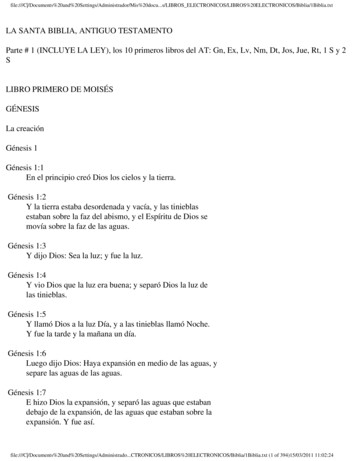

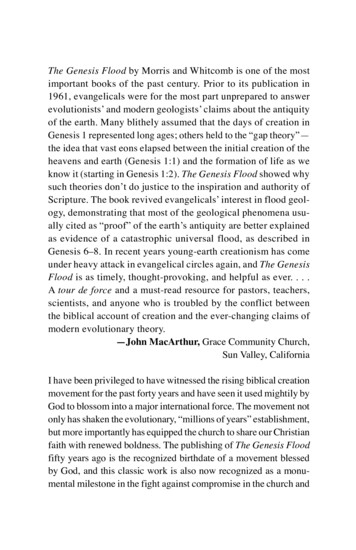
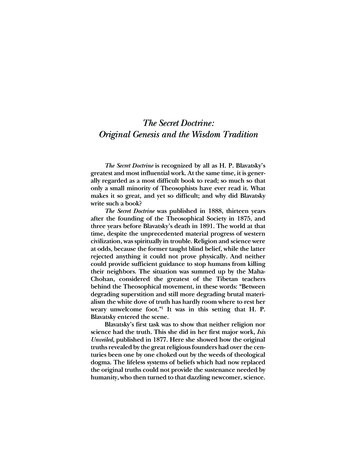
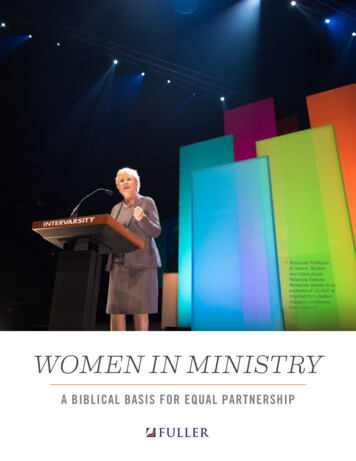
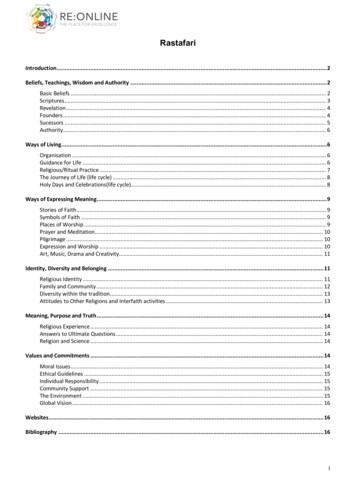
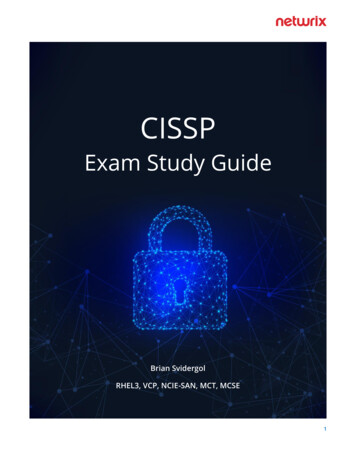
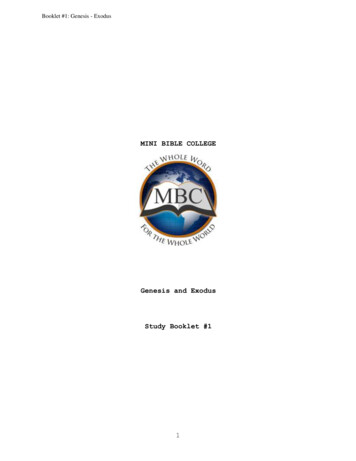
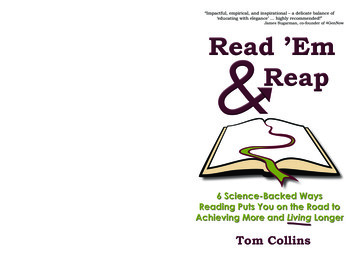
![[Page 1 – front cover] [Show cover CLEAN GET- AWAY 978-1 .](/img/13/9781984892973-6648.jpg)
